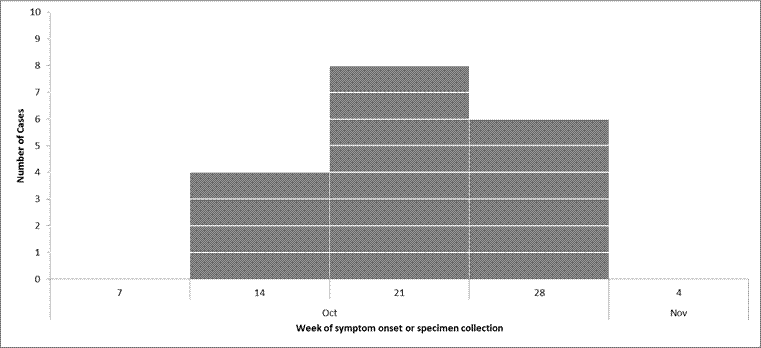The Public Health Agency of Canada is collaborating with provincial public health partners, the Canadian Food Inspection Agency, Health Canada, as well as the United States Centers for Disease Control and Prevention (U.S. CDC) and the United States Food and Drug Administration (U.S. FDA), to investigate an outbreak of E. coli infections in Ontario and Quebec, and several U.S. states.
In Canada, based on the investigation findings to date, exposure to romaine lettuce has been identified as a source of the outbreak, but the cause of contamination has not been identified. Laboratory analysis indicates that the illnesses reported in this outbreak are genetically related to illnesses reported in a previous E. coli outbreak from December 2017 that affected consumers in both Canada and the U.S. This tells us that the same strain of E. coli is causing illness in Canada and the US as was seen in 2017 and it suggests there may be a reoccurring source of contamination. Investigators are using evidence collected in both outbreaks to help identify the possible cause of the contamination in these events.
The current outbreak appears to be ongoing as illnesses linked to romaine lettuce continue to be reported. These recent illnesses indicate that contaminated romaine lettuce may still be on the market, including in restaurants, grocery stores and any establishments that serve food. At this time, the investigation evidence in Ontario and Quebec suggests that there is a risk of E. coli infections associated with eating romaine lettuce.
As the risk is ongoing, the Public Health Agency of Canada is advising individuals in Ontario and Quebec to avoid eating romaine lettuce and salad mixes containing romaine lettuce until more is known about the outbreak and the cause of contamination. Currently, there is no evidence to suggest that residents in other parts of Canada are affected by this outbreak. The U.S. CDC has also issued communications with similar advice for U.S individuals in affected states. The outbreak investigation is ongoing, and this public health notice will be updated as the Canadian investigation evolves.
In Canada, as of November 20, 2018, there have been 18 confirmed cases of E. coli illness investigated in Ontario (3) and Quebec (15). Individuals became sick between mid-October and early November 2018. Six individuals have been hospitalized, and one individual suffered from hemolytic-uremic syndrome (HUS), which is a severe complication that can result from an E. coli infection. No deaths have been reported. Individuals who became ill are between 5 and 93 years of age. The majority of cases (56%) are female.
Most of the individuals who became sick in Ontario and Quebec reported eating romaine lettuce before their illnesses occurred. Individuals reported eating romaine lettuce at home, as well as in prepared salads purchased at grocery stores, or from menu items ordered at restaurants and fast food chains.
The Canadian Food Inspection Agency is working with public health officials and the U.S. FDA to determine the source of the romaine lettuce that ill individuals were exposed to. If contaminated food products are identified in Canada, they will take the necessary steps to protect the public, including recalling the product as required. Currently, there are no Food Recall Warnings associated with this outbreak.
This outbreak strain known as E. coli O157 is more likely than other strains to cause severe illness. Pregnant women, those with weakened immune systems, young children and older adults are most at risk for developing serious complications.
Most people who become ill from an E. coli infection will recover completely on their own. However, some people may have a more serious illness that requires hospital care, or long-lasting health effects. In rare cases, some individuals may develop life-threatening symptoms, including stroke, kidney failure and seizures, which could result in death. It is possible for some people to be infected with the bacteria and to not get sick or show any symptoms, but to still be able to spread the infection to others.
What you should do to protect your health
It is difficult to know whether a product is contaminated with E. coli because you can’t see, smell or taste it. Romaine lettuce can have a shelf life of up to five weeks, and therefore it is possible that contaminated romaine lettuce purchased over the past few weeks may still be in your home. Restaurant and retailers may also still be selling romaine lettuce products. Consumers are advised to use the information in this public health notice to help make informed decisions about their own personal health situations. Individuals in Ontario and Quebec should avoid eating romaine lettuce and salad mixes containing romaine lettuce until more is known about the outbreak and the cause of contamination.
This outbreak is a reminder that romaine lettuce and other leafy greens can be a carrier of E. coli. It is important to always follow safe food handling practices if you are preparing, handling, and serving any type of lettuce. The following tips will help reduce your risk of an E. coli infection, but they will not fully eliminate the risk of illness.
- Wash your hands thoroughly with warm water and soap for at least 20 seconds, before and after handling lettuce.
- Unwashed lettuce, including whole heads of lettuce sold in sealed bags, should be handled and washed using these steps:
- Discard outer leaves of fresh lettuce.
- Wash unpackaged lettuce under fresh, cool running water. There is no need to use anything other than water to wash lettuce. Washing it gently with water is as effective as using produce cleansers.
- Keep rinsing your lettuce until all of the dirt has been washed away.
- Don’t soak lettuce in a sink full of water. It can become contaminated by bacteria in the sink.
- Store lettuce in the refrigerator for up to seven days. Discard when leaves become wilted or brown.
- Use warm water and soap to thoroughly wash all utensils, countertops, cutting boards and storage containers before and after handling lettuce to avoid cross-contamination.
- Ready-to-eat lettuce products sold in sealed packages and labelled as washed, pre-washed or triple washed do not need to be washed again. These products should also be refrigerated and used before the expiration date.
Symptoms
People infected with E. coli can have a wide range of symptoms. Some do not get sick at all, though they can still spread the infection to others. Others may feel as though they have a bad case of upset stomach. In some cases, individuals become seriously ill and must be hospitalized.
The following symptoms can appear within one to ten days after contact with the bacteria:
- nausea
- vomiting
- headache
- mild fever
- severe stomach cramps
- watery or bloody diarrhea
Most symptoms end within five to ten days. There is no real treatment for E. coli infections, other than monitoring the illness, providing comfort, and preventing dehydration through proper hydration and nutrition. People who develop complications may need further treatment, like dialysis for kidney failure. You should contact your health care provider if symptoms persist.
What the Government of Canada is doing
The Government of Canada is committed to food safety. The Public Health Agency of Canada leads the human health investigation into an outbreak, and is in regular contact with its federal, provincial and territorial partners to monitor the situation and to collaborate on steps to address an outbreak.
Health Canada provides food-related health risk assessments to determine whether the presence of a certain substance or microorganism poses a health risk to consumers.
The Canadian Food Inspection Agency conducts food safety investigations into the possible food source of an outbreak.
The Government of Canada will continue to update Canadians as new information related to this investigation becomes available.
Epidemiological information
The figure below is an epi curve for this outbreak. This information is used by outbreak investigators to show when illnesses began, when they peak, and when they trail off. It can take several weeks from the time a person becomes ill to when this illness is reported and testing confirms a link to the outbreak. Data are available for 18 cases.

- Une élève de Wawa exerce son leadership au Sénat des élèves du CSC Nouvelon - February 20, 2026
- Wawa student demonstrates her leadership on the CSC Nouvelon Student Senate - February 20, 2026
- The Boob Bus is Back! - February 19, 2026
 Wawa-news.com Local and Regional News
Wawa-news.com Local and Regional News

